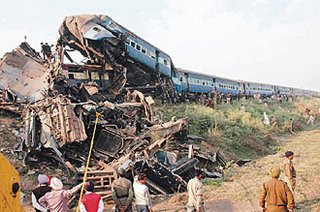
Some remarks on poor filmmaking techniques in Bollywood
Yesterday, I saw a movie having some good actors and with potentially a great storyline. The movie was "Dhoop" starring Om Puri and Revathi. To make a long story short, the movie was a lesson in bad filmmaking.
Here are some of the obvious things wrong with the movie, and with bad Bollywood movies in general:
Sound-editing in mainstream Indian movies is really inept. The sound of footsteps in almost all Bollywood movies is artificially generated and does not fade in volume as a character goes away. Non-verbal human sounds, e.g. whimpering, sniffing, taking a deep breath are mostly artificially done too, and are too loud to be realistic.
Dialogue delivery is a disaster. It is as if people can't wait to deliver their dialogues. The silent intervals between dialogues are never right. The facial expressions are too facile and crude. Example: The first interaction between Peehu and Professor Kapoor at the college staircase.
Comedy in Bollywood movies depends upon many hackneyed paradigms. Cultural sterotypes (Haryanvi Jaat, Punjabi Sardaar, dwarfish comedians etc.), repetition of the same phrase in different situations (Mogambo Khush Hua), seemingly funny costumes, unrealistic situations, ...
Emotionally, Bollywood movies seem to be ages behind their western counterparts. Be it parent-child relationships, marital or love relationships, friendships, siblings, everything is so badly un-creative and crude that you wonder if the movie was made for kids. Affectively, Indian movies are devolving instead of evolving. The affective themes in older Bollywood movies were stronger and deeper. Examples: Mrs Kapoor's reaction to her son's death, Peehu's response to her suitor, Professor's response to the SHO when asked about proof whether he is his son's father; all are crude emotional hysterics instead of real emotional responses of realistic people.
Too many songs, just to make a music album out of every movie, whether or not the song disturbs the continuity of the movie.
There is hardly any attention to detail. Example: Om Puri in Dhoop is going around in his car in Delhi without wearing a seat belt.
Bad camera techniques. No camera angles which would require even a moderate amount of effort or work. Example: Om Puri receiving a mysterious letter and the camera doesn't even focus on it, because Om Puri's position is too awkward for a good shot.
Convoluted dialogues and rationales. Just to further the story, debates seem to be without any strength. There has been hardly any Bollywood movie in India in which there is an actual debate and discussion about a topic. Example: Why should Om Puri go in for the petrol pump? What a nice debate (sic).
Laughable denouement at the end. So the prime minister intervenes so that Om Puri can get an electricity connection? And Om Puri, instead of recognizing the Prime Minister as the center of the whole system that he is fighting, instead naively appeals to the PM, and ridiculously, the PM suspends 16 officials including a few peons here and there. The ruffian who is ready to rape the mother and the daugther-in-law gets reformed in a second when he sees the framed photo in the couple's home. What a joke the whole thing is.
Let's see how a more realistic or mature version of this movie would have evolved:
"Dhoop" would have been a metaphor for the giver or sustainer of life, turning tormentor.
There are a college teacher and his librarian wife living in a small DDA flat in Delhi (instead of the posh bungalow with servants etc.). The wife is suffering from painful eyes which are always hurting from harsh lighting, especially direct sunlight.
Their son, a reasonably normal man (instead of the chivalrous brave handsome mother-loving hunk) is killed in the Kargil war and is awarded a medal and a "petrol pump connection" (as compensation) is given to his parents.
The parents debate whether to take the allotment or not, alternately missing their son and thinking of money to be made from the pump, to survive them in their old age, now that inflation is so high.
They decide to go in for the pump, but are thwarted at every level by government corruption. The father is at his wits' end and he develops back ache and asthma. He runs from pillar to post to get the sanctions necessary and finally manages, by emotional pleas and sheer persistence. When the father makes statements in the press, he is threatened and beaten by hired thugs. He suffers a fracture. The police frame a case against him for sexually molesting a college student.
He writes to the chief minister's office and gets an appointment. When he visits the Chief Minister's office, he finds him a little hazy. He hands over his file and comes back. The next day, he is arrested for the framed offense but gets bail by efforts of some friends. He gives up the idea of the petrol pump and sells his allocation to a local don. He moves to his ancestral village and starts running a nursery and a small school.
A few years later, he visits the pump allocated to his son and finds it in the midst of an adulteration scam (kerosene mixed with petrol). The day is very hot, the sun is shining almost right into his eyes. He buys a liter of petrol from the pump named after his son, a pack of sleeping pills, quietly goes to his earlier home (which is now in a decrepit condition, pending a court case), takes the pills, drinks the adulterated petrol and dozes off to death. A cloud obstructs the sun for a couple of seconds, and vanishes.

